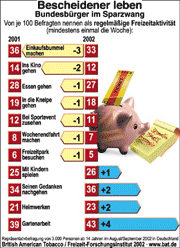Leisure Time Monitor 2002
Living more modestly – German citizens under pressure to save money
BAT Leisure Monitor 2002 with current data on the consumption and lifestyle habits of Germans
""Back to the simple life"—that was the American mantra during the Gulf War. The world after September 11, 2001, the debate surrounding the high cost of living, the economic crisis, and the Iraq conflict are currently triggering similar reactions among German consumers. Frugal consumers are setting the tone, while experiential consumption is stagnating across the board. Compared to the previous year, the percentage of regular shoppers fell from 36 to 33 percent, and the percentage of moviegoers from 14 to 12 percent. Restaurants, amusement parks, and sporting events are also experiencing stagnant visitor numbers. This is according to the recently published annual "Leisure Monitor 2002," in which the Leisure Research Institute of British American Tobacco has been surveying a representative sample of 3,000 people aged 14 and over in Germany about their leisure, consumption, and lifestyle habits since 1995.
""Consumer sentiment is oscillating between pessimism and pragmatism, between the need to save and the hunt for bargains," says Prof. Dr. Horst W. Opaschowski, head of the BAT Institute. "Everything that previously made life pleasant and enriching is being temporarily restricted. Going out to eat, excursions, and travel are no longer a given for many citizens." While the fundamental positive attitude that "leisure time is precious to Germans" remains unchanged, the realization is increasingly taking hold that one must also be able to afford experiential consumption during leisure time.
Young people are reducing their cinema visits (2001: 44% – 2002: 40%), singles are going to pubs less often (43% / 39%), couples are cutting back on restaurant visits (37% / 34%), and families with children are taking fewer weekend trips (18% / 11%). Consumer-intensive leisure activities are feeling the effects of tighter household budgets the most.
2002: Uncertain consumers – declining willingness to buy – growing pent-up demand
Convenient and thoughtless consumption is reaching its financial limits. Essential expenses for daily needs (food, drink, clothing, and personal care), as well as ongoing costs for rent, insurance, and debt repayment, leave little room for discretionary leisure budgets. Consumers are becoming more cautious and postponing some of their experiential consumption – from vacations and spending on hobbies and sports to buying a car. With declining purchasing power, the willingness to buy decreases, while at the same time, pent-up demand grows. "The trend toward experiential consumption has passed its peak," says Professor Opaschowski. "The event-like nature of leisure activities costs too much money. Now, more personal initiative is needed, as well as the ability to engage with oneself.""
Feeling comfortable at home is becoming important again: playing with children (2001: 25% – 2002: 26%), DIY projects (21%/23%), and gardening (39%/43%). People buy what they need. There's no sign of a shopping spree, but neither is there any consumer austerity. Leisure time remains consumption time. But people are increasingly living by the principle: "I don't always have to spend money." And a new experience is emerging: consumption consumes time. Those who consume a lot quickly find themselves short on time. Conversely, those who consume less can enjoy their own time affluence more. "Letting one's thoughts wander" (2001: 34% – 2002: 36%) is, after all, free. This leaves more time for oneself – and perhaps for others as well.
The new comprehensive data volume "Leisure Monitor 2002" contains – listed according to socio-demographic characteristics such as gender, age, education, income, life phase, etc. – detailed information on 61 different leisure activities, from television and PC to museum and theatre, to voluntary work in church, party, trade union or association.
The representative survey of 3,000 people aged 14 and over was conducted between August 17 and September 11, 2002.
Sources of supply
The data volume "Leisure Monitor 2002" (optionally as a study or CD-ROM) is available immediately from BAT Freizeit-Forschungsinstitut GmbH, Alsterufer 4, 20354 Hamburg for a nominal fee of 49.80 euros (Fax: 040/4151 32 31 and on the Internet at www.bat.de).
When placing an online order, please indicate in the comments section of the form whether you would like to receive the study as a CD-ROM or in script form.
See also directory of all publications



